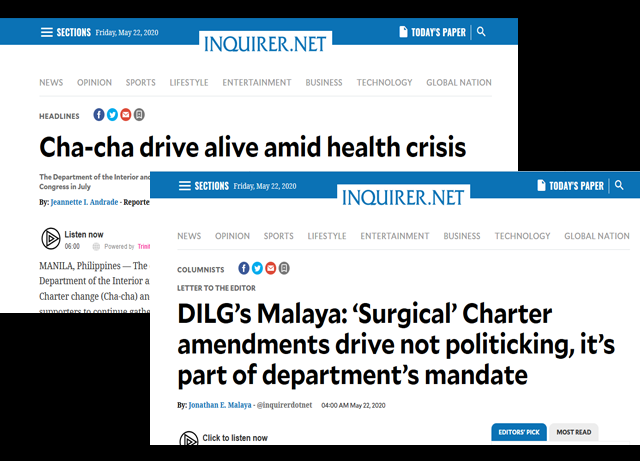Inquirer blasts DILG drive for charter change amid pandemic

PUBLIC OPINION polls have again and again found that federalism and Charter change (Cha-cha) are not priority issues for Filipinos. The shift to federalism was among President Rodrigo Duterte’s promised changes when he took office in 2016, but the bills filed by his allies that tried to do that have not prospered. In July 2019, he did not even mention the subject in his State of the Nation Address.
Why then, while the administration has foundered in addressing the challenges of the COVID-19 pandemic, is government campaigning to collect two million citizen signatures in support of Charter change?
CMFR cheers the Philippine Daily Inquirer for calling attention to the efforts of the Department of Interior and Local Government (DILG) to rally public support for the government’s untimely revival of its efforts to change the Constitution. Most Filipinos are indifferent to the call for federalism, and, because the administration has neither provided the details nor fully explained why it wants the change, cannot understand what the fuss is all about.
On May 17, the Inquirer published as its banner story “Cha-cha drive alive amid health crisis.” The report described the signature campaign for constitutional reform (CORE), and the announcement that signatures could be done online so as to meet its target of getting two million signatures by July.
The Inquirer based its story on DILG memoranda it obtained, and whose authenticity it confirmed with Interior Undersecretary Jonathan Malaya. Two documents, issued January 28 and March 27, directed DILG regional directors to gather two million signatures in support of Charter change. The signature drive has been part of the “Balangayan roadshows” that DILG started in October 2019. DILG plans to present proof of public support for Charter change to Congress.
According to the report, Malaya told the Inquirer duringa phone interview that another memo instructing regional directors to focus on anti-COVID efforts had placed the Cha-cha campaign in the back burner. The May 11 memorandum said the signature campaign is postponed, but advised regional directors and their civil society partners to use DILG’s CORE website to continue the campaign.
On May 18, in an interview on ANC, DILG Secretary Eduardo Año called the report on the signature campaign “fake news.” Malaya agreed with the fake news label because the DILG, he said, is “not campaigning for Cha-cha. We are advocating for CORE together with Congress. Ours is just amendments and not a revision, therefore not Cha-cha. It’s not even federalism.”
The Inquirer in its May 17 report quoted Malaya’s clarification that the CORE campaign is “different from federalism since this is just amendments and not revision of the Constitution.” But he did not elaborate what the amendments were.
The Inquirer neverthelessstood by its story in a statement posted on Inquirer.net. The broadsheet’s May 20 editorial was more strongly-worded, calling the DILG’s dedication of time and resources to the campaign an “inessential, wasteful pursuit.” It further argued that “None of the bright boys in the DILG had thought the very idea of gathering signatures for purported Charter change in the midst of doling out aid to desperate ordinary folk would, at the very least, raise questions whether those signatures were obtained under deceit or duress. After those two million signatures are tallied and presented as a sterling accomplishment by the DILG, who’s to say starving Filipinos were not coaxed or forced to sign papers pledging support for federalism in exchange for the cash relief promised them?”
The Inquirer’ report suggests that even during a public health emergency, the current administration has not quite given up its charter change agenda. Amendments may not have to do with a shift to a parliamentary or federal system, but they are still matters of significant change and must be discussed when the nation is not plagued by issues of survival.
The media would do well to assign their local correspondents to keep a sharp eye on whether the DILG continues the campaign in the regions.
Malaya’s response
On May 22, the Inquirer published Malaya’s letter to the editor, in which he took exception to the paper’s reports and editorial. Malaya said he explained the “clear and distinct difference” between “Charter change” and “constitutional reform” to Jeannette Andrade, the reporter who wrote the story. But Andrade and the Inquirer’s desk did not even “take pains” to know the difference.
He further said that DILG is not prioritizing the campaign precisely because of COVID-19, but their partner civil society organizations are the ones conducting the online signature drive. He maintained that the CORE advocacy seeks to address uneven development across regions, and is part of the “Balik Probinsya” program, the government’s “long-term readiness plan against pandemia.”
CMFR believes that the Inquirer was not wrong to report the campaign. It is the function of the press to flag political developments, and the engagement of the DILG in these constitutional questions is a matter of public interest, as it has a role in matters related to the Philippine National Police. DILG’s involvement in political issues such as Charter change or specific constitutional amendments is potentially if not already coercive. The House leadership did not even prioritize the issue when it started sessions this year. So this campaign is curious, to say the least, and media’s looking into it is not out of place. Any constitutional change needs congressional discussion anyway, and what amendments to the Constitution the DILG may seek should be discussed in those chambers as a matter of public record.
Leave a Reply